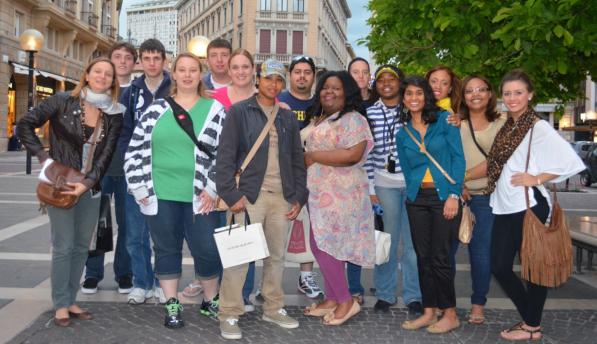International Studies
Want a degree that focuses on cultural and professional learning that spans the globe?
The International Studies program will give you the skills you need — learning an additional language, cultural awareness, professional studies — whether you plan to work or live in the United States or abroad. And as globalization continues, the demand for internationally aware individuals will only increase.
Best of all, you can customize the degree according to your interest. For example, learn German with a professional focus in business and management. Or discover more about the French culture, while pursuing a museum studies education.
An International Studies-focused degree qualifies you to work in many fields, including business and commerce, government service, travel and tourism, communications, teaching, and science and engineering.

What Will I Learn?
- Critical thinking: Students will be able to critically analyze academic texts, international news, maps, histories and their own received ideologies.
- Applying disciplinary contexts: Students will understand how to use background, geographical context, political information, economic systems, etc.
- Connections: Students will begin to see the connections between world events and the multiple contexts that inform them.
- Skills: Students develop core liberal arts skills: reading unfamiliar information and making sense of it; thinking critically about what they read.
- Global awareness: Students develop knowledge, skills, and attributes needed to live in a world characterized by ethnic diversity and cultural breath.
Full list of International Studies program goals can be found on the Hub for Teaching and Learning site.
Degree Requirements
Learn about degree requirements and coursework for the International Studies major.
Program Components
Component I: Language and Culture (courses in Arabic, French Studies, German, or Spanish)
Component II: Professional Studies (courses in Art Administration, Business and Management, Communications, Computer and Information Science, Economics, Engineering, Environmental Studies, History, Museum Studies, Natural Sciences, or Political Science)
Component III: Cognates (courses in studies which will provide the larger international context)
Making the Most of Your Major
There are opportunities to develop skills and connect with others interested in International Studies beyond the classroom. Check out the International Studies Major Map to get a more detailed, year-by-year view of how you can learn, engage, network and transform your community and prepare for life after graduation.
Get Involved
Join La Mezcla (Spanish Club) or the Arabic Tea hour, or many of the events that the French and German disciplines organize. Get involved with Globally United Students Association (GUS) or explore UM-Dearborn student organizations on VictorsLink.
Get Real World Experience
International Studies concentrators are encouraged to participate in approved programs of study abroad sponsored by the University of Michigan or other institutions of higher learning. The faculty view study abroad as a unique educational and enrichment experience which allows students to progress rapidly in language learning while acquiring firsthand knowledge of another culture.
Students are also encouraged to complement their coursework by completing an internship in an appropriate placement.
Plan for Life After Graduation
The International Studies program directly addresses the needs of employers who are increasingly involved in international trade and who require employees with a knowledge of other cultures, languages, and economic systems in addition to a solid professional background. Officers of multi-national corporations in Detroit, who were consulted regarding the design of the International Studies curriculum, indicate a strong employment potential for graduates of the program. Career Services offers assistance with job searching, resumes, interviews or graduate school applications.
General Program Information
- Bachelor of Arts - Major/Honors
- International Studies Three-Year Course Cycle
- Internship opportunities available
- Scholarships available
You're not only learning a language, but also professional aspects like political science, communication,— DANIELA GIRALDO, INTERNATIONAL STUDIES (SPANISH CONCENTRATION)
